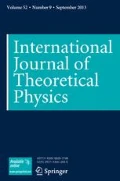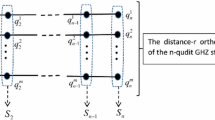Abstract
Quantum secret sharing (QSS) provides an efficient way for managing keys securely. Generally, the dishonest participant is a stronger attacker than others in QSS, and then the participant attack should be particularly analyzed. In this paper, the security of two QSS protocols based on GHZ states and local measurements has been further reviewed. Using the participant attack model, Hillery et al. (Phys. Rev. A 59, 1829, 1999) and general HBB-like protocols are analyzed, and they are both insecure: the dishonest participant can restore all of the key without being detected just using local unitary operation and local measurements. Even inserting some nonorthogonal states in the phase of distributing particles, the dishonest participant can also restore all of the key without being detected just using local unitary operation and local measurements. Two key factors of insecurity are deduced: the dishonest participant and the sender have the same ability to control GHZ states, and there are no monitoring strategies in the secret recovery phase. Therefore, how to design multi-party key distribution protocols fixing the two security vulnerabilities is meaningful.
Similar content being viewed by others
References
Liu, F., Li, F., Chen, J., Xing, W.: Uncertainty-like relations of the relative entropy of coherence. Quantum Inf. Process 15(8), 3459–3465 (2016)
Gao, D., Liu, F.: Distribution of additive quantum resources. Int. J. Theor. Phys. 59(11), 3640–3645 (2020)
Gisin, N., Ribordy, G., Tittel, W., Zbinden, H.: Quantum cryptography. Rev. Mod. Phys. 74(1), 145 (2002)
Gao, F., Guo, F.Z., Wen, Q.Y., Zhu, F.C.: Revisiting the security of quantum dialogue and bidirectional quantum secure direct communication. Sci. Chin. Ser. G: Phys. Mech. Astron. 51(5), 559C566 (2008)
Liu, F., Gao, D., Cai, X.: Comparison of operational advantages of superposition in operational discrimination. Acta Electronica Sinica 48(2), 303–307 (2020). (in Chinese)
Zhang, E.N., Sun Q.-D., Liu, Y.-P.: Collusion-free rational multi-secret sharing scheme. Comput. Sci. 42(10), 164–169 (2015)
Qin, S.J., Gao, F., Wen, Q.Y., Zhu, F.C.: Cryptanalysis of the Hillery-Buz̆ek-Berthiaume quantum secret-sharing protocol [J]. Phys. Rev. A 76(6), 062324 (2007)
Liu, F., Qin, S.J., Wen, Q.Y: A quantum secret sharing protocol with fairness. Physica Scripta 89(7), 075104 (2014)
Liu, F., Su, Q., Wen, Q.Y.: Eavesdropping on multiparty quantum secret sharing scheme based on the phase shift operations. Int. J. Theor. Phys. 53(5), 1730–1737 (2014)
Hillery, M., Buz̆ek, V, Berthiaume, A.: Quantum secret sharing. Phys. Rev. A 59(3), 1829 (1999)
Liu, F., Gao, D., Cai, X.: General resource theory of quantum coherence in multipartite system. Acta Physica Sinica 68(23), 230301 (2019). (in Chinese)
Hu, M.L., Hu, X., Wang, J., Peng, Y., Zhang, Y.R., Fan, H.: Quantum coherence and geometric quantum discord. Phys. Rep. 762-764, 1–100 (2018)
Fang, K., Wang, X., Tomamichel, M., et al.: Quantum channel simulation and the channel’s smooth max-information. IEEE Trans. Inf. Theory 66 (4), 2129–2140 (2020)
Gao, F., Qin, S.J., Huang, W., Wen, Q.Y.: Quantum private query: A new kind of practical quantum cryptographic protocol. Sci. Chin. Phys. Mech. Astron. 62(7), 70301 (2019)
Wei, C.Y., Cai, X.Q., Liu, B., Wen, Q.Y.: A generic construction of quantum-oblivious-key-transfer-based private query with ideal database security and zero failure. IEEE Trans. Comput. 67(1), 2–8 (2018)
Gao, D.M., Xin, Y., Ye, Z.L., Qiao X.Y.: Separable states can be used to realize the fair quantum communication. Int. J. Quantum Inf. 17(1), 1950004 (2019)
Acknowledgements
This work is supported by NSFC (Grant No. 61771294).
Author information
Authors and Affiliations
Corresponding author
Additional information
Publisher’s Note
Springer Nature remains neutral with regard to jurisdictional claims in published maps and institutional affiliations.
Rights and permissions
About this article
Cite this article
Bai, QX. Participant Attacks on Quantum Secret Sharing Based on Local Measurements. Int J Theor Phys 60, 1705–1711 (2021). https://doi.org/10.1007/s10773-021-04792-2
Received:
Accepted:
Published:
Issue Date:
DOI: https://doi.org/10.1007/s10773-021-04792-2




